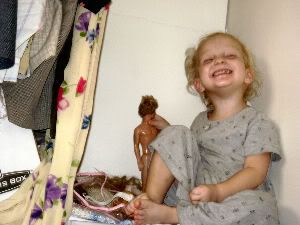 Caylee Anthony has been in the news quite a bit again these past few days. She was two-years-old when she "disappeared," and let's not kid ourselves, the girl is dead.
Caylee Anthony has been in the news quite a bit again these past few days. She was two-years-old when she "disappeared," and let's not kid ourselves, the girl is dead.That's the case in national news.
There have been a few local cases of child death lately. None have caught the attention of the national press the way Caylee's case has, but a few of them are more horrific.
Eliseo Gonzales, Jr was killed by his aunt. She claims it was an accident, that she merely
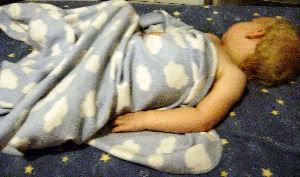 rolled over on him. (This is the woman who weighs approximately half a ton.) She has been charged with murder, and his mother has been charged with neglect for leaving him with this person in defiance of a Child Protective Services order. He was two.
rolled over on him. (This is the woman who weighs approximately half a ton.) She has been charged with murder, and his mother has been charged with neglect for leaving him with this person in defiance of a Child Protective Services order. He was two.Sariyah Garcia, age two, and her infant brother were murdered by their mother and her boyfriend (I'm not sure offhand whether he's the father of either child or not) and stuffed in a plastic bag and "hidden" under a house on the south side back in 2007. Their mother had, apparently, had other children taken from her by Child Protective Services.

Baby Grace's body was found last year in a storage container in Galveston Bay. A tiny little body, with long blonde hair.
Riley Ann Sawyers, it turned out. Beaten to death by her mother and her mother's boyfriend, allegedly for being impolite.
Another two-year-old.
It's not only two-year-olds who are being killed, of course. Researching this post brought up the story of Makala Cantu, four years old, who was killed by her mother because she wouldn't stop crying. This is another mother who had a history with CPS.
But it certainly seems to me that two is a dangerous age.
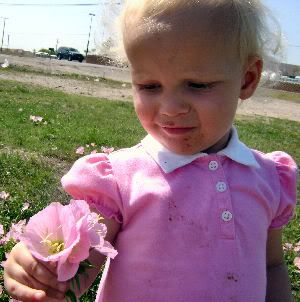 Maybe I am just more sensitive to it because I have a two-year-old of my own.
Maybe I am just more sensitive to it because I have a two-year-old of my own.I do know that Bexar County has a higher incidence of deaths from abuse or neglect than the national rate. (Almost three deaths per 1,000 here, instead of almost two deaths per 1,000 nationally, according to this article.)
I also know that our teen pregnancy rate is damn near twice the national average. In Bexar county, the rate is 39 births per 1,000; the national average is 21 per 1,000. (Source.)
Are the two connected? I don't know.
There was an article in the newspaper a couple of months ago, early June I think. An almost-two-year-old little boy was laying in bed in the hospital, beaten by his mother's boyfriend. He was on life support with little hope of recovery. He had curly blond hair, little golden ringlets. He looked so much like my youngest daughter that I had to put the newspaper down; it was too upsetting to read it, because it was like looking at my own baby in that hospital bed.
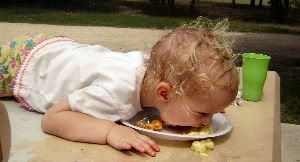
(I cannot find a citation for that article, as I don't remember any of the names involved.)
I look at my own kids when I hear these stories. I think we all do. I wonder what pushes a person to hurt a child. I know some of the risk factors. Age, substance abuse, unrealistic expectations, a history of having been abused yourself.
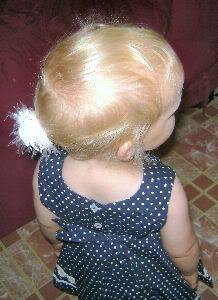
And yet...And yet, I do not understand it. I simply do not.
I understand post-partum depression. Been there, done that, damn glad they don't give out t-shirts.
I understand how damned frustrating and annoying toddlers can be. During the course of writing this, I had to send Esther off into her sisters' bedroom to play, because she kept throwing things on the floor and I was losing my temper.
I understand what it's like to lose your temper. I've yelled at my girls sometimes, like just about every parent has, and felt like week-old shit afterwards.
I understand how it seems sometimes that toddlers misbehave constantly. I've curtailed dinners out, shopping trips, even trips to the park for nonstop misbehavior. I have threatened to turn this car around and drive right back home. (Yesterday, in fact.)
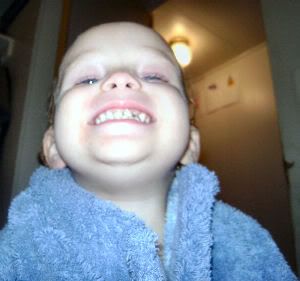 But I do not understand following through on that anger and frustration by hurting your child.
But I do not understand following through on that anger and frustration by hurting your child.I wonder what we can do.
There was an article in the newspaper a few months ago on the "controversial" practice of attachment parenting. Controversial.
Know what attachment parenting is? There are some who'll set out a whole list of dos and don'ts when it comes to attachment parenting. And, true, there are things AP parents tend to do. Breastfeed for a startlingly long time. Allow our babies to sleep in our beds. HOLD our babies, sometimes almost constantly.
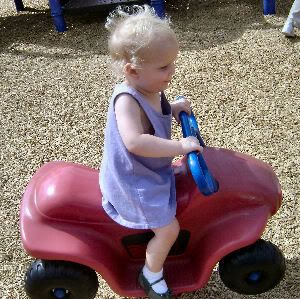
But if you strip it all away, it all boils down to this: Attachment parenting means that you treat your children--ALL of your children--with the exact same respect that you treat any adult.
That's it. Respect. You realize that the little person standing in front of you is a person. An individual. Not a proto-person. Not a personality-to-be. But someone else.
This doesn't mean you treat your children as adults, or that you let them run the house.
It means you respect them.
And if that is controversial, it shouldn't be.
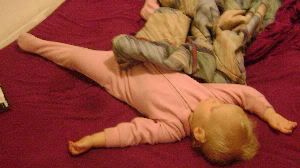
There are a variety of parenting styles out there. I'm not going to get all "my way or the highway" here.
All I'm sayin' is this: Mamas with a proper attachment to their children do not abuse them, or allow them to be abused. It's that simple. In order to systematically abuse and eventually kill another person, most of us must first detach from that person and dehumanize them.
What's the right way to go about this, to make sure parents have the right attachment? That's the question I'm struggling with now.

I know there are some things that can help. I know that holding your baby--simply learning to respond by picking your infant up when she starts to cry--makes a difference in attachment. I don't know if it's pheromones or what, but holding your baby and smelling your baby helps you realize what a wonderful thing that baby is.
I know that breastfeeding helps. I almost hesitate to go here, because it's such a taboo subject, and I don't want to seem like I'm very much on the edge. But it's true. We know the mechanisms of this one. Breastfeeding stimulates the release of oxytocin, which has been variously called things like "the trust hormone" or "the love hormone." Oxytocin's one of those feel-good hormones. It's released in breastfeeding.
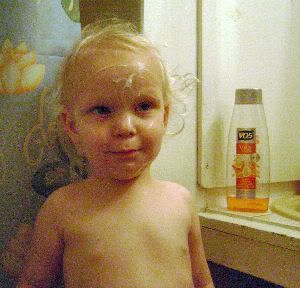 It's released in orgasm. It helps promote bonding. (Obligatory disclaimer: Breastfeeding, of course, is not the only way to bond with your children. Just ask the fathers of breastfed babies whether they're bonded with their kids. Duh.) There's some evidence that oxytocin acts upon the brain to promote maternal actions.
It's released in orgasm. It helps promote bonding. (Obligatory disclaimer: Breastfeeding, of course, is not the only way to bond with your children. Just ask the fathers of breastfed babies whether they're bonded with their kids. Duh.) There's some evidence that oxytocin acts upon the brain to promote maternal actions.I think that education in child development would help. I'd like to see this made part of science class. (We studied it somewhat in psychology in high school.) This would help to address the issue of unrealistic expectations. Riley Ann Sawyers, after all, was killed for being impolite. I've heard of several cases of children badly beaten because of messing themselves during potty-training. Maybe knowing what a child is capable of, both physically and psychologically, would help. God knows that learning children have essentially no impulse control before age three made a huge difference in my parenting.
But beyond that? I don't know. I don't know what to do to try to help, on a practical level. And I want to help, because what's the use of recognizing a problem if you don't try to do anything about it? Saying "Damn, something needs to be done about that," and then not even trying to do anything is not an authentically conservative way of behaving. I can't just sit and wait for the government to do something, because the government isn't equipped, simply is not designed, to stop problems before they happen. But I feel like I am spinning my wheels, because I just don't know where to start.
I mentioned this at church earlier this summer, and one of the other parishioners said she knew of a charity here in San Antonio that does some of what I want to do--they assign teen mothers mentors, which I think is an excellent idea--but I don't remember the name and she hasn't been back to church since that week (or if she has, it's been at one of the services I missed), so even there I'm stuck.
I'm open to suggestion.

5 comments:
What an incredible post. So sad to see all of these cases in the media. Your little one is completely adorable. :)
(I'm TopazGirl from MD, btw)
Your daughter is very cute.
I don't understand how anyone could hurt a child let alone their own mother. Someone would have to climb over my dead body to get to mine.
I have left a full grocery cart and walked out with a toddler who was throwing a fit. I have also put my children in their cribs and walked out of the room when I needed a time out.
I think if we could teach new parents some coping mechanisms, they would do so much better. I know so much more now than I did when I had my first child.
The mentoring program sounds like an excellent idea. I think you are right on target with the attachment and bonding too.
I also advocate and support breastfeeding whenever possible.
And people ask why I do what I do in BACA, why I'm so willing to sacrifice myself for the cause...
The scary part is, there's worse that goes on. Won't tell tales (I think you'd like to be able to get sleep tonight)...
What a wonderful post, and what a lovely child.
The only thing I would disagree with is the breastfeeding. Back in my childrearing days, breastfeeding was not encouraged in the least, so my children were bottle fed. The difference? I made darned sure that there was never a "propped" bottle - my kids were held and cuddled by either my spouse or myself druing all feedings, right up to the time they were weaned.
Parents are in such a hurry, these days, to make kids grow up. They want them potty trained at a year, reading by three, taking responsibility by five. It was never intended to happen in human development that way. Parents need to be educated in child development before becoming parents!
Kate, I don't think breastfeeding is the be all and end all, but it does have that hormonal connection.
Bottle feeding while holding your baby and paying attention to your baby can be a wonderful, loving thing. I am sad to say, though, that I can count on one hand the number of times I've seen someone not prop a bottle since I've been home, and still have a finger left to flip somebody off with. There is such a disconnect embodied in bottle propping, not to mention the simple fact that it can be dangerous.
Post a Comment